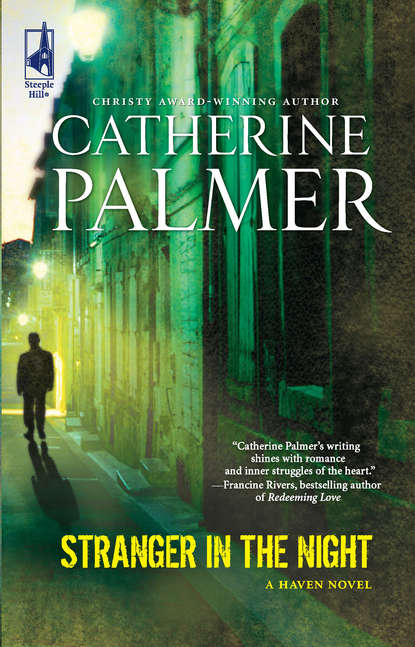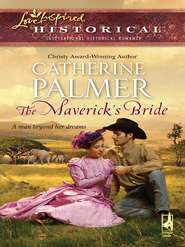По всем вопросам обращайтесь на: info@litportal.ru
(©) 2003-2024.
✖
Stranger In The Night
Автор
Год написания книги
2019
Настройки чтения
Размер шрифта
Высота строк
Поля
Expecting the men to reach for handguns, Joshua was surprised when Terell picked up a can of pepper spray. Defensive weapon. Strange choice, he thought.
Sam reached for a box he kept under his bed. He offered it to his friend.
Gleaming steel knives. Joshua glanced up in confusion. Sam and he were both expert marksmen.
“We keep a low profile around here,” Sam said with a shrug.
Fingers closing around a slender stiletto, razor sharp, Joshua considered his friend’s arsenal. A knife was an offensive weapon. That fit with what he knew of Sam Hawke. Highly trained leaders, the men were still very much alike.
The German shepherd led the way out of the humid room, across a dank landing to a flight of chipped concrete steps.
“Male,” Terell said as they began the descent.
“Agreed.” Sam’s voice was husky. “White.”
“Nah, black. A kid. Scared.”
Joshua realized this must be a nightly guessing game.
“Middle-aged,” Sam offered. “Drunk.”
“Bleeding.”
“Probably.” Sam picked up a first-aid kit near the stairwell. “Knife wound.”
“Gunshot.”
None of it sounded good to Joshua.
The three men crossed the cavernous gym, the site of Haven’s single basketball court, two foursquare layouts, and just enough room for a gaggle of jump-ropers. Duke huffed with anticipation as he padded ahead. Yet another round of knocking began as they arrived at the front door.
“Whatcha need?” Terell called.
“Open the door. Please open.”
At the pleading voice outside, Sam and Terell looked at each other, blue eyes meeting brown.
“Illegal alien,” Sam said. “Adult male. Lost.”
“Bet he got kicked out of his apartment,” Terell muttered, reaching for the bar that secured the door.
Joshua weighed the stiletto in his palm. Earlier that evening, Sam had told him that African-American kids were a consistent majority at Haven. Latin Americans were part of the mix, too—most poor, persecuted, living on the brink. Unable to obtain visas or achieve refugee status, their parents had spent all they had and risked their lives to enter the U. S. illegally.
But the composition of the neighborhood had begun to change in recent months. Charitable foundations were resettling refugees by the score in St. Louis. An influx of immigrants from Burma, Somalia, Sudan, Congo, Bosnia and other war-torn countries led to new youngsters stepping timidly through the metal detector at Haven’s front door.
Long ago, Sam and Terell had decided to take a “don’t ask, don’t tell” policy regarding legal documentation, they told Joshua. Haven was about the business of God’s work. And the Lord had laid out a clear mandate for His people to welcome the alien.
“You ready?” Sam asked, flicking a glance at Joshua.
He gave a brief nod as he sized up Terell. Tall and massively built, the man held up his slender can of pepper spray while Sam lifted the bar and drew back the bolt.
At the slide and click of metal against metal, wisps of Joshua’s nightmare floated across his mind. He gritted his teeth. The door swung open.
Liz Wallace turned a page in her scrapbook and ran a fingertip over the photograph of her parents waving goodbye at St. Louis’s Lambert Airport. They had no clue that within three days, their precious child would be sitting down to a meal of roasted bush rat.
In fact, they never found out the whole story. You couldn’t just fire off an e-mail that read, Hi Mom and Dad. Ate monkey meat and fried termites for dinner today.
This was not the kind of thing that would boost their enthusiasm for Liz’s dreams of becoming a foreign aid worker. Of course, her brief trip to the Democratic Republic of Congo hadn’t exactly been about transforming the plight of a Third World nation. She and her college teammates went to help rebuild a primary school that had been hit too many times by mortar fire. They put up a few walls and hurried home.
But that trip, more than a year before, had changed Liz’s life. The moment she graduated from college, she took a job with Refugee Hope, a resettlement agency in St. Louis. Her goal: to learn Swahili, enter a training program and move to Africa to work for the United Nations in refugee camps.
On this stifling night, unable to sleep after long hours toting supplies to incoming families from Burma and Bosnia, Liz couldn’t sleep. Not unusual. Most days she was so exhausted she could hardly stand up. But after arriving home to her studio apartment, eating a quick bite of dinner and checking her schedule for the next day, she felt her second wind kick in. Wide-awake and unable to turn off her brain by 2:00 a.m., she made a cup of decaf tea and settled on her sofa with the scrapbook.
Liz turned the page and studied the faces gazing back at her, impassive and worn. She had briefly considered decorating the page in the colors of the Congo flag and placing stickers of wild animals here and there. But why distract from the beauty of the Congolese people with their buttery chocolate skin and deep eyes?
Yet what suffering the people had endured. Until that trip, Liz had never heard of such horrors. She understood now that Rwanda’s civil war had sent nearly a million refugees pouring over the border into Congolese camps. When those refugees began to build power to retake their homeland, they enlisted the help of men in Congo’s government. That brought resistance.
War began in Congo in the fall of 1996, complete with genocide, looting and genital mutilation. In some areas, soldiers raped more than half the women. Almost fifty thousand children were kidnapped and forced into combat, slave labor, sexual servitude.
Not long after a cease-fire was signed in 1999, insurgent groups led a second uprising. Yet another peace treaty was signed in 2003. By the time Liz arrived in Kinshasa, more than four million people had died. Some were killed in the conflict, but most perished from disease and starvation.
Three million were homeless. Houses, hospitals and schools lay in rubble. Fields and food supplies were burned. People hovered on the brink of starvation.
Under the umbrella organization of Refugee Hope, Liz cared for many of those woeful survivors who arrived in St. Louis. She wasn’t doing much to help, though. Her job was mostly desk work. Filing government forms.
She wondered if anyone could prevent genocide. Probably not.
Four sets of dark eyes stared back at Joshua. He had seen this before—a man, a woman, two children, a plea for help written on earnest faces. Their innocence could belie a body strapped with explosives. In battle, Joshua had learned not to trust any expression of virtue. But this wasn’t warfare—not the combat kind, anyway.
With a tired smile, Sam stepped into the open doorway of Haven. “Hey, there,” he greeted them. “What can we do for you tonight?”
The man gave an awkward little bow. Skin of polished ebony glowed in the streetlight. His gray shirt was too big, made of cotton, short-sleeved and wrinkled. Khaki trousers sagged at the ankles. Shoes, cracked patent leather with frayed laces, had parted at the seams to reveal threadbare socks.
“Good evening, sir,” he said, clutching a battered suitcase. A faint British accent, Joshua noticed. “I am Stephen Rudi. If you please, may I present my wife, Mary. And here is my daughter, Charity, and my son, Virtue. We come from Paganda.”
“What are you folks doing on the street at this time of night?” Sam asked. “This is a dangerous area.”
“Yeah, and it’s after two in the morning.” Terell was peering at his Rolex, evidently a vestige of his once-lucrative basketball career. “Mr. Rudi, your children ought to be in bed.”
“Indeed, sir. But we have had a most unfortunate day. Please, may I explain? You see, we had recently arrived in Atlanta when we received a letter from my wife’s brother. This man is our only family member to escape the recent unrest in Paganda. He invited us to join him here, where we could live with him and find better jobs. We traveled to St. Louis by bus, arriving this morning. But we searched all day, and we could not find him.”
“Aha.” Terell stifled a yawn. “So, you’re from where? South Africa?”
“Paganda, sir. It is in East Africa, near Lake Victoria.”
Joshua could see that neither Sam nor Terell recognized the country. He didn’t recall much about it himself. Former British colony. Few natural resources. Tribal conflict—humanity’s constantly failing effort to eradicate enemies. Sunnis and Shiites. Kurds and Iraqis. Hindus and Muslims. Nazis and Jews. Spaniards and Aztecs. Settlers and Natives. Boers and British.
Extermination never worked, but people forgot that. Again and again they attempted the wholesale slaughter of their foes. Genocide wouldn’t end until trumpets rang out in the eastern sky to announce the end of time.










